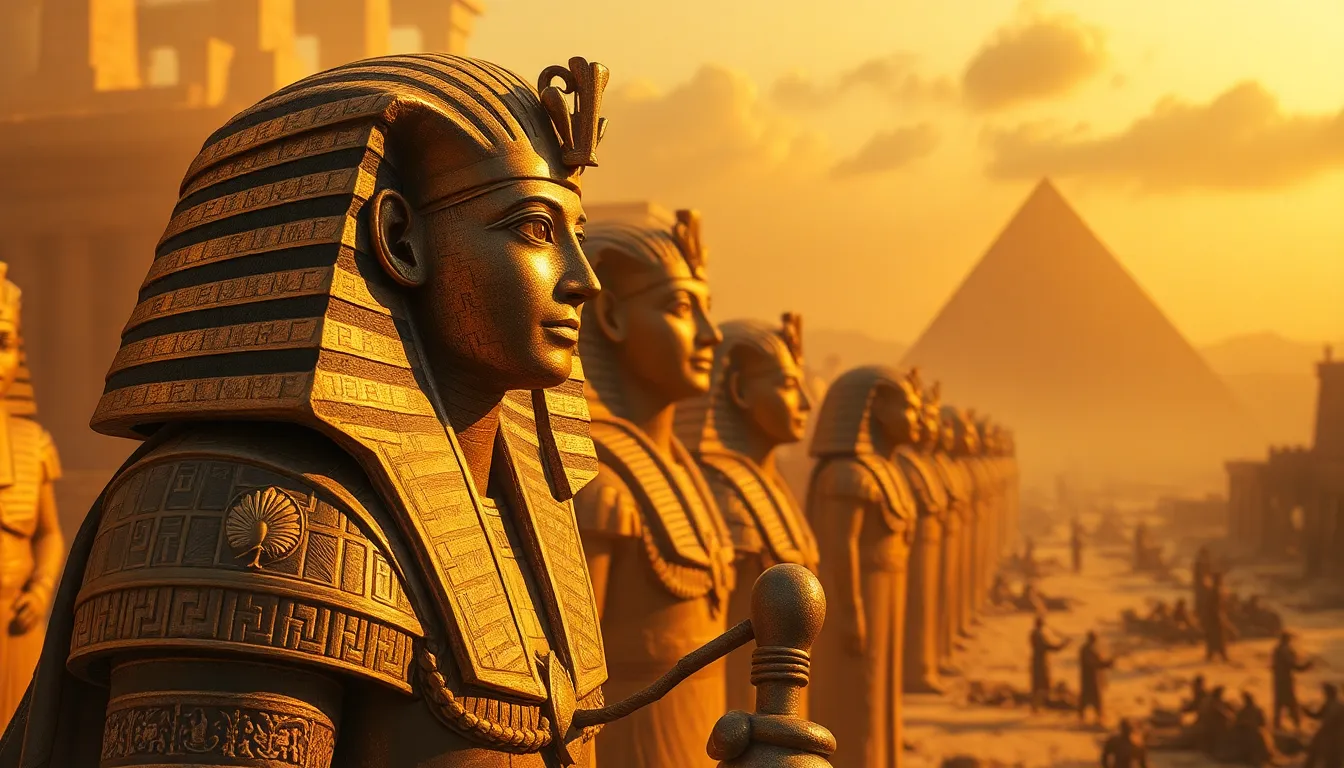The Myths of Pharaoh Thutmose III’s Legacy in Warfare
I. Introduction
Pharaoh Thutmose III, often hailed as one of ancient Egypt’s most formidable rulers, reigned during the 18th Dynasty from approximately 1479 to 1425 BCE. His reign marked a pinnacle of military power and territorial expansion for Egypt, earning him the moniker the Napoleon of Egypt. However, the significance of his legacy extends beyond mere military conquests, as the narratives surrounding his exploits have evolved into powerful myths that shape our understanding of him today.
Warfare played a crucial role in Thutmose III’s legacy, not only in establishing Egypt as a dominant empire but also in crafting his image as a military genius. This article aims to debunk common myths surrounding Thutmose III’s military exploits, providing a clearer picture of his contributions to ancient Egyptian history and warfare.
II. The Historical Context of Thutmose III’s Reign
To understand Thutmose III’s legacy, one must first examine the political landscape of Egypt before and during his rule. The New Kingdom era, characterized by territorial expansion and military prowess, saw Egypt flourish economically and culturally. However, it was also a time of intense competition and conflict with neighboring powers.
Thutmose III ascended to the throne following the death of his stepmother, Hatshepsut, who had served as regent and co-ruled with him. His early military campaigns were marked by a series of successful expeditions that established his reputation as a formidable leader. The following points highlight the key aspects of his reign:
- The consolidation of power after Hatshepsut’s death.
- Strategic military campaigns against Nubia and the Levant.
- The establishment of Egypt as a dominant power in the ancient Near East.
III. Myth 1: Thutmose III was the Greatest Military Strategist of His Time
One prevalent myth is that Thutmose III was the greatest military strategist of his era. While he undoubtedly employed effective military strategies, a closer examination reveals that he was not operating in isolation.
Thutmose III’s military campaigns showcased a combination of innovative tactics and traditional Egyptian warfare practices. His approach included:
- The use of chariots in battle, which provided mobility and speed.
- Incorporation of archers and infantry in coordinated attacks.
- Surprise tactics, as evidenced in the Battle of Megiddo.
However, when compared to contemporaneous military leaders, such as the kings of Mitanni or the Hittites, Thutmose III’s strategies were part of a broader context of military evolution. He was certainly skilled but not without influential predecessors and rivals whose tactics also shaped warfare during that period.
IV. Myth 2: Thutmose III Won Every Battle He Fought
Another common misconception is that Thutmose III was undefeated in battle. The reality is more nuanced, with both victories and defeats marking his military career.
The Battle of Megiddo is often highlighted as his most significant triumph, showcasing his strategic brilliance. However, Thutmose III faced challenges, including:
- Defeats at the hands of rebellious vassal states.
- Logistical issues that sometimes hampered military campaigns.
- Resistance from local populations, leading to prolonged conflicts.
These challenges did not significantly tarnish his reputation but did illustrate that his military career was not without its difficulties.
V. Myth 3: Thutmose III’s Army was Unbeatable
The idea that Thutmose III commanded an unbeatable army is misleading. While his forces were indeed formidable, they were not invincible.
The composition of Thutmose III’s army included:
- Charioteers, infantry, and archers.
- Specialized units trained for specific combat roles.
However, the army also had limitations, including:
- Vulnerabilities to guerrilla tactics employed by local tribes.
- Dependence on supply lines that could be disrupted in hostile territories.
Additionally, alliances played a significant role in enhancing his military strength, highlighting the collaborative aspects of warfare in ancient Egypt.
VI. Myth 4: Thutmose III Single-Handedly Expanded Egypt’s Empire
Perhaps the most egregious myth is that Thutmose III single-handedly expanded Egypt’s empire. In reality, the expansion was a collective effort involving various leaders and military generals.
While Thutmose III led many campaigns, he was supported by:
- Competent generals who executed his strategies on the ground.
- Diplomatic efforts that complemented military conquests.
Furthermore, the expansion of Egypt’s empire was a continuous process, shaped by the contributions of earlier pharaohs and subsequent leaders who built upon Thutmose III’s achievements.
VII. The Legacy of Thutmose III in Modern Interpretation
The myths surrounding Thutmose III have significantly influenced contemporary views of this iconic pharaoh. Popular culture often glorifies his military exploits, portraying him as an invincible warrior.
However, archaeological discoveries and historical research are gradually reshaping our understanding of his legacy. Key aspects include:
- New findings that provide insights into the realities of ancient warfare.
- A more nuanced portrayal of Thutmose III as a ruler who blended military might with diplomacy.
As a result, modern interpretations of Thutmose III reflect a more comprehensive view, recognizing both his accomplishments and the complexities of his reign.
VIII. Conclusion
In summary, the key myths surrounding Thutmose III’s legacy reveal a complex figure whose military achievements were significant but not without their limitations. Understanding these myths is essential for appreciating the historical accuracy necessary to comprehend ancient leaders and their impacts.
Thutmose III’s true impact on warfare and Egyptian history lies not only in his military conquests but also in the collective efforts that shaped his reign. Acknowledging the myths and the realities allows us to appreciate the multifaceted nature of his legacy.




